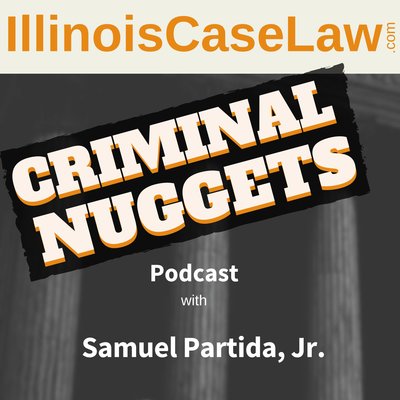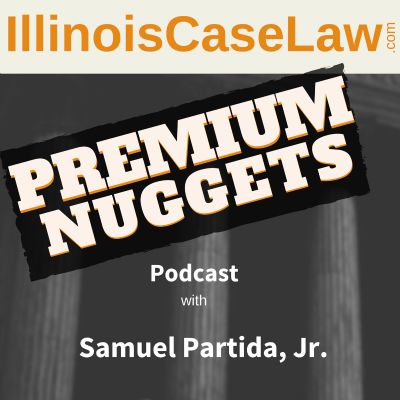Sep 2, 2018
People v. Simmons, 2016 IL App (1st) 131300 (September). Episode 245 (Duration 9:10).
Trial judge easily dismisses shoddy firearm expert testimony and sustains life sentence in this murder case.
See Also...
How to Admit An Expert Witness And
Exclude An Unreliable One
Expert Witnesses Under Higher
Scrutiny
Expert Witness Defined by Marisa
Tomei from My Cousin Vinny is Credible
Background
Defendant was proven guilty beyond a reasonable doubt, where the three eyewitnesses identifications of defendant as the shooter bore sufficient indicia of reliability and were corroborated by firearms evidence linking defendant to the crime.
Holding
The trial court did not abuse its discretion in admitting the testimony of the State’s firearms identification expert where the deficiencies in his testimony merely affected its weight, not its admissibility. This court respectfully disagreed with People v. Safford, 392 Ill. App. 3d 212 (2009), as well as the body of appellate case law that has developed under Safford, on the question of the appropriate standard of review of the sufficiency of the foundation for an expert’s opinion.
Expert Witness
A witness may be qualified to testify as an expert “by knowledge, skill, experience, training, or education.” Ill. R. Evid. 702.
Along with establishing an expert’s credentials, “[t]he admission of expert testimony requires the proponent to lay an adequate foundation establishing that the information on which the expert bases her opinion is reliable.”
And to determine whether that information is reliable, the court must ask whether it is “of a type reasonably relied upon by experts in the particular field in forming opinions or inferences upon the subject.” Ill. R. Evid. 703.
“If a proper foundation has been laid, the expert’s testimony is admissible, but the weight to be assigned to that testimony is for the jury to determine.”
Defendant's Argument
Defendant notes that, like the expert in Safford, the State's firearm expert simply testified to the process he uses to compare bullets and his ultimate conclusion that the bullets matched.
He noted that the class characteristics of the bullet matched but could not identify any of the individual characteristics that he found to be comparable between the two bullets. And, as the State's firearm expert conceded, the individual characteristics of two bullets are what enables him to determine whether two bullets match; the class characteristics alone cannot establish a match.
Court Agreed Expert's Testimony Was Shoddy
The reviewing court agreed with defendant that the State's firearm expert testimony was, to say the least, sparse, it did not agree that the defects in his testimony rendered it inadmissible.
The basis for a witness’ opinion generally does not affect his standing as an expert; such matters go only to the weight of the evidence.
The weight to be assigned to an expert opinion is for the jury to determine in light of the expert’s credentials and the factual basis of his opinion. Although the State's firearm expert did not explain what individual characteristics he saw that led him to conclude that the bullets matched, the absence of any such specificity simply went to the weight of his opinion.
Defendant Cross
Defense counsel certainly probed the State's firearm expert's opinion during cross-examination and argued that the jury should disregard it because it lacked any reasoned basis.
In fact, defense counsel even elicited evidence that there is a more objective method for firearm identification—the consecutive matching stria method—that he did not use. The reviewing court agreed with defendant that the State's firearm expert's opinion is similar to the expert opinion found to be inadmissible in Safford, but it declined to follow Safford.
Safford Is An Outlier
“Safford is an outlier case,” and no court since Safford has required that an expert disclose the specific reasons for his opinion as a prerequisite to admissibility.
Thus, the court in Negron found that “the fact that [the latent fingerprint examiner did not rest his analysis or ultimate opinion on a specific number of comparison points” simply went to the weight of his opinion that certain fingerprints matched.
And looking to Safford itself, this court concluded that its analysis was flawed. While the court in Safford cited the principle that the information on which an expert bases his opinion must be reliable (Safford, 392 Ill. App. 3d at 221), it did not correctly analyze that principle.
That principle centers on whether “the underlying facts or data upon which [the expert] seeks to base an opinion are of a type reasonably relied upon by experts in the particular field.”
But the majority in Safford asked a different question—whether the expert sufficiently detailed the reasons for his opinion. The presence or absence of such details is not the same as whether the expert relied on information of a type reasonably relied upon by experts in his field.
In this case, the State's firearm expert testified that he relied on the two bullets’ class characteristics and individual characteristics to reach his conclusion. He testified that other firearms and toolmark examiners rely on this information in conducting their analyses.
Thus, the State established that the State's firearm expert based his opinion on reliable information, i.e., information on which other experts in his field rely.
Expert Provided No Details
That he did not specify which individual characteristics matched on these particular bullets (i.e., the basis of his opinion) simply affected the weight of his opinion—a question for the jury to resolve, not a question for the court to resolve when deciding whether to admit or exclude the State's firearm expert's testimony.
Moreover, this reviewing court disagreed with the court’s conclusion in Safford that the failure to reveal the basis for an expert opinion necessarily curtails a defendant’s right to cross-examine the expert.
This case provides an excellent example. Here, defense counsel cross-examined the expert on his inability to specify which individual characteristics he identified as matching on the two bullets.
And she was able to elicit testimony that the Illinois State Police lack objective criteria to guide their firearms comparison, and that the consecutive matching stria method of identification has a more objective, data-driven foundation.
Defense counsel then used these points in her closing argument.
Finally...
While the expert's testimony did not help defendant—defendant would have benefitted most had the State's firearm expert's testimony been excluded entirely—his inability to recall which individual characteristics he identified did not preclude defense counsel from ably cross-examining him.



